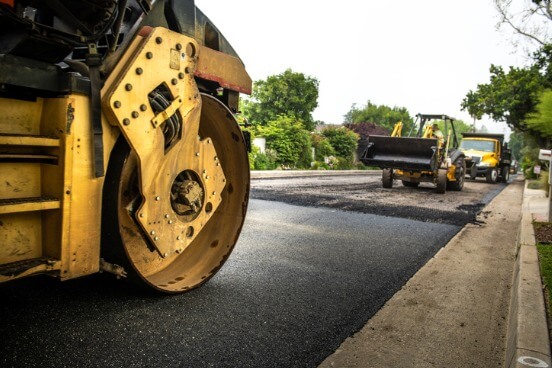Quality Paving Services That Endure for Years
Quality Paving Services That Endure for Years
Blog Article
Exploring the Different Sorts Of Asphalt Paving and Their Benefits
The landscape of asphalt paving encompasses a range of types, each engineered to resolve certain needs and environmental factors to consider. From the robust attributes of Hot Mix Asphalt to the environment-friendly attributes of Recycled Asphalt Pavement, recognizing these options can substantially influence job end results. Innovations such as Warm Mix Asphalt and Porous Asphalt present added layers of efficiency and sustainability. As we check out these various paving remedies, the nuanced advantages they provide might stun you and possibly alter your method to future paving jobs.
Warm Mix Asphalt
When considering the most effective paving solutions, hot mix asphalt (HMA) stands out as a premier choice for numerous applications (paving). HMA is a versatile paving material known for its durability, flexibility, and overall performance. It is generated by home heating asphalt binder and incorporating it with accumulations at high temperature levels, making sure an uniform mix that can endure various environmental problems
Among the main advantages of HMA is its ability to offer a smooth, skid-resistant surface, boosting safety and security for automobiles and pedestrians alike. Furthermore, HMA exhibits excellent resistance to contortion, making it suitable for high-traffic locations such as highways and car parking lots. Its flexibility to different climates better adds to its extensive usage.
The installment process of HMA is relatively fast, enabling efficient task completion with marginal interruption to traffic. In addition, it can be reused, reducing waste and advertising sustainability within the building industry. On the whole, hot mix asphalt continues to be a top choice for paving professionals because of its durable efficiency attributes and long-term cost-effectiveness, making it a trusted service for numerous facilities demands
Warm Mix Asphalt
Cozy mix asphalt (WMA) offers an ingenious choice to hot mix asphalt, giving similar benefits while calling for lower production temperature levels. Generally generated at temperature levels in between 190 ° F and 250 ° F, WMA innovation decreases energy consumption and greenhouse gas exhausts during production, making it an extra eco-friendly option.
This versatility can lead to enhanced compaction and total longevity of the asphalt surface area. Additionally, WMA can be used in various applications, ranging from highways to residential driveways, without compromising performance.

The consolidation of additives or customized binders in WMA contributes to its enhanced residential or commercial properties, guaranteeing that it meets or exceeds efficiency criteria. Moreover, WMA's minimized thermal effect during production can decrease the chance of damages to the surrounding atmosphere, making it an appealing choice for lasting paving methods.
Cold Mix Asphalt
Cold mix asphalt is a versatile paving remedy typically made use of for short-term fixings and low-traffic click here now areas. This kind of asphalt is generated at ambient temperatures, making it a hassle-free choice for quick solutions and projects where standard warm mix asphalt may not be possible. The combination generally contains asphalt binder, accumulation, and additives, enabling it to continue to be workable for an extended duration.
Among the key benefits of chilly mix asphalt is its simplicity of application. It can be mounted without specialized devices, making it easily accessible for smaller sized contractors and DIY lovers. In addition, cool mix can be applied in various weather, which is specifically useful for urgent repair requirements.

It may not provide the very same long-lasting sturdiness as hot mix asphalt, its fast application and versatility make it an excellent selection for momentary solutions and low-traffic applications. On the whole, chilly mix asphalt remains a sensible choice in the asphalt paving landscape.
(explore options)
Porous Asphalt
Permeable asphalt is an ingenious paving service designed to boost stormwater administration and reduce surface area overflow. This type of asphalt includes a distinct structure that includes interconnected voids, permitting water to penetrate through the surface area and into the underlying layers. By promoting natural drainage, permeable asphalt helps alleviate the risk of flooding and lessens the concern on municipal stormwater systems.
Among the primary advantages of permeable asphalt is its capability to boost water top quality. As stormwater filters via the pavement, toxins and sediments are caught, reducing the variety of contaminants that go into neighborhood waterways. This adds to much healthier communities and sustains compliance with environmental laws.
Furthermore, permeable asphalt can enhance the durability of the sidewalk itself. By reducing water build-up on the surface area, it minimizes the capacity for freeze-thaw cycles that can bring about breaking and damage. The lowered need for standard stormwater monitoring framework can result in cost financial savings for towns and designers.
Recycled Asphalt Sidewalk
(see details)Recycled asphalt sidewalk (RAP) represents a sustainable technique to roadway building and upkeep that profits both the setting and the economy. By reusing existing asphalt materials, RAP minimizes the need for brand-new raw materials, which in turn saves all-natural sources and decreases ecological impact. This practice lowers energy usage and greenhouse gas discharges connected with the manufacturing of brand-new asphalt.
The unification of RAP right into brand-new sidewalk combinations can additionally lead to significant cost savings. Professionals can leverage recycled materials to decrease overall project expenses, making it an economically viable option for municipalities and private programmers alike. In addition, RAP supplies equivalent efficiency attributes to virgin asphalt, making sure toughness and durability in road surfaces.
RAP's versatility permits it to be made use of in different applications, including highways, parking whole lots, and household driveways. By improving the structural integrity of existing sidewalks, RAP contributes to improved safety and security and level of smoothness of roads.
Conclusion
Warm Mix Asphalt succeeds in sturdiness and rapid setup for high-traffic locations, while Warm Mix Asphalt improves sustainability through minimized power consumption. Cold Mix Asphalt offers as an economical choice for immediate repairs, Porous Asphalt successfully manages stormwater, and Recycled Asphalt Pavement advertises ecological responsibility.
Report this page